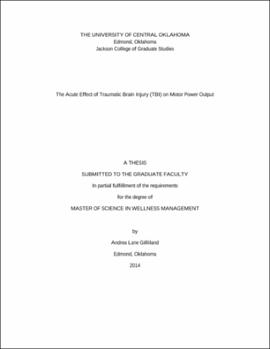| dc.contributor.advisor | Fent, Darla | |
| dc.contributor.author | Gilliland, Andrea Lane | |
| dc.date.accessioned | 2020-07-10T20:14:31Z | |
| dc.date.available | 2020-07-10T20:14:31Z | |
| dc.date.issued | 2014 | |
| dc.identifier.other | (AlmaMMSId)9982422284902196 | |
| dc.identifier.uri | https://hdl.handle.net/11244/325198 | |
| dc.description.abstract | There has be an increased interest in the chronic effects of traumatic brain injury (TBI) in contact sports from both research and nonscientific fields alike. The chronic effects can only be minimized by understanding the physiological processes and acute effects associated with a TBI that ultimately give rise to chronic effects. Sports-related TBIs are assessed with computerized neuropsychological test batteries and self-reported symptoms. A quantitative measure of neural activity acutely post-TBI may offer information to diminish premature return-to-play, and subsequent neural injuries. Thirteen collegiate football players initially participated in baseline testing where motor power output was measured with electromyography (EMG) contemporaneous with peak torque output, total work, and average power output via the HUMAC Norm isokinetic dynamometer (IKD). One participant successfully completed the study after sustaining a concussion during spring football. He returned for identical testing procedures at 24 hours and 7 days post-TBI. The subject had a significant decrease across all measurements at 24 hours post-TBI. Neural activity and power outputs had improved at 7 days post-TBI, but had not returned to baseline. This case study highlights the appearance of electrophysiological dysfunction acutely after TBI, but does not offer information on the impaired mechanism: rate coding, synchronization, or frequency. The acute decrease in power output may be attributed to a decrease in neural signaling following a head injury. Further research should be conducted with more participants to clarify the cause of a significant decline in motor power output immediately after TBI. | |
| dc.rights | All rights reserved by the author, who has granted UCO Chambers Library the non-exclusive right to share this material in its online repositories. Contact UCO Chambers Library's Digital Initiatives Working Group at diwg@uco.edu for the permission policy on the use, reproduction or distribution of this material. | |
| dc.subject.lcsh | Brain | |
| dc.subject.lcsh | Sports injuries | |
| dc.title | The acute effect of traumatic brain injury (TBI) on motor power output. | |
| dc.type | Academic theses | |
| dc.contributor.committeeMember | McKibbin, Jeff | |
| dc.contributor.committeeMember | Mather, Robert | |
| dc.thesis.degree | M.S., Wellness Management | |
| dc.subject.keywords | Concussion | |
| dc.subject.keywords | Electromyography | |
| dc.subject.keywords | Motor Power Output | |
| dc.subject.keywords | Sports Concussion | |
| dc.subject.keywords | TBI | |
| dc.subject.keywords | Traumatic Brain Injury | |
| dc.identifier.oclc | (OCoLC)ocn932081647 | |
| uco.group | UCO - Graduate Works and Theses::UCO - Theses | |
| thesis.degree.grantor | Jackson College of Graduate Studies | |
